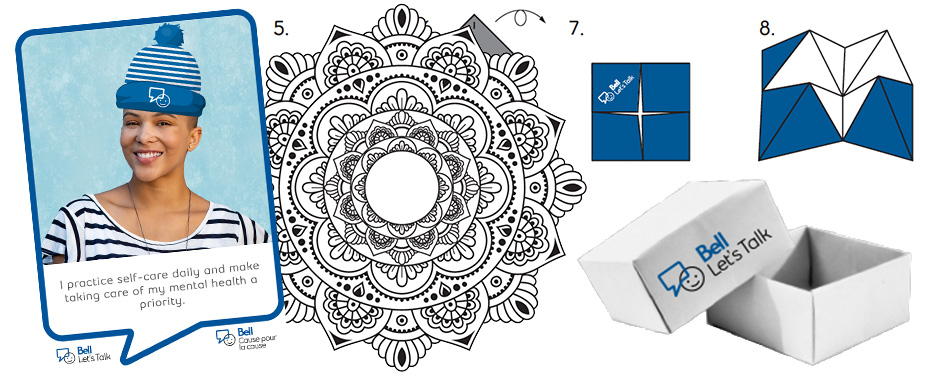Eduvation Blog
Thursday, January 28, 2021 | Category: Eduvation Insider
Let’s Press Pause and Talk Wellness

Good morning!
This afternoon I’ll be sitting down (virtually) with a group of higher ed marketers for the third time this week, for the quarterly meeting of what we affectionately call “The Guild.”
We’ll be talking about student recruitment in these unusual times, but everyone ELSE in the country will be talking about mental health today, because of course it’s Bell Canada’s 11th annual “Let’s Talk” Day. I’ve collected >800 articles about mental health and wellness in the past 10 months (my poor database!) but today I’ll share just a few of the most timely.
First, though, there have been some developments on the COVID19 front since my last update Tuesday…
Pandemic Pulse

The Real Picture: A collaborative effort by researchers at the Technical U of Vienna (Austria), Tsinghua U (China), and KAUST (Saudi Arabia) has finally scanned the COVID19 virus at high resolution with cryo-electron tomography, producing the closest thing so far to a real image of the novel coronavirus. (Colour doesn’t exist at nanoscales, but has been added for clarity.)
Travel Restrictions: The UK, SA (South Africa), Brazil and CA (California) variants are continuing to spread, leading Manitoba to impose a 14-day quarantine on anyone entering the province (starting tomorrow), and leading PM Justin Trudeau to warn Canadians to cancel any non-essential travel, even between provinces, as new restrictions are coming.
Fighting for Vaccine: EU officials are demanding immediate delivery of “tens of millions of doses” of Pfizer and AstraZeneca vaccines that have been delayed, from British plants if necessary. They are threatening export controls on vaccines produced on the continent, potentially interrupting or reducing further shipments from Belgium to Canada and Australia.
Vaccine Effectiveness: On Tuesday I reported that Moderna announced preliminary findings that suggest its vaccine is still effective, although somewhat less so, against the B1351 (South Africa) variant. Now, Pfizer/BioNTech are reporting likewise that their vaccine “appeared to lose only a small bit of effectiveness” in similar testing.
Another Canadian Trial: Another domestic vaccine, from Providence Therapeutics of Calgary, has started early-stage clinical trials with 60 subjects. If all goes well, phase 2 trials could begin in May, and the vaccine could potentially be released by the end of 2021.
A New Indignity: And, ahem, China has made anal swab tests part of the regimen for COVID19 patients in quarantine. Doctors report that people continue to test positive from the lower digestive tract days after nasal and throat swabs test negative. 80% of respondents in a Weibo poll said they “could not accept” yet one more government “intrusion.” (Who can blame them?)
COVID on Campus
The accelerating spread of more contagious variants of COVID19 in the US is starting to shut down athletics and major campuses…
uMichigan reports 175 cases of COVID19 in the student population since the term began Jan 19, and 14 of those have been the more contagious B117 (UK) variant. UM and the local PHO are urging a “stay-at-home recommendation” for all students until Feb 7 (except for “going to classes, getting food, work and other necessary in-person activities”), and weekly testing. US News
Since yesterday’s newsletter, there were reports of 11 more COVID19 cases associated with CdnPSE campuses. (Many cases go unreported, but see my master spreadsheet for a running tally.)
uGuelph reported 4 more cases in campus housing, associated with the unsanctioned social gatherings Jan 15-16. (Total now 53 student cases from this outbreak.) So far, 32 have been fined for attending, and further penalties may include an $880 provincial fine, and/or eviction from residence. The university has installed additional security cameras and stepped up patrols, and is still considering a curfew. CBC
uManitoba reports a total of 63 positive cases on campus since Sept (5 more than I had tallied). UM
Mohawk College reports 2 new cases, at the Stoney Creek and Fennell campuses. “The two students involved are enrolled in different programs and their infections have been linked to community contact, not through participation in required on-campus college programming.” Mohawk
Mental Health
Mental health has been a high priority topic for higher education leaders for a decade or more, but after a brutal year of the pandemic, the urgency of the crisis is growing…
Police Wellness Checks Rise
I mentioned yesterday that crime dropped in many US cities during last year’s lockdown. Unsurprisingly, with more widespread lockdowns here, StatsCan reports that police-reported crime fell 18% during Mar-Oct 2020. (Although >40% of Canadians experienced some kind of cybersecurity incident – see my round up of cybersecurity and PSE from last week.) On the other hand, police “service calls” rose 8%, with wellness checks up 13% and mental health calls up 12%. Assaults between family members fell less steeply, and in fact threats by family members rose 2%, reflecting more “together” time, if not quality time. Globe & Mail
Mental Health Side-Effects of COVID
It’s one thing to say that this pandemic, recession, lockdown, and personal tragedies are causing mental health challenges for people – but quite another to find that COVID19 literally causes neurological damage and mental illness. Research from Oxford finds that 13% of COVID patients gets diagnosed with their first neurological or psychological condition within 6 months, from depression to strokes and intracranial bleeding. (Overall, 33.6% of COVID patients have such conditions within 6 months.) The causality is not yet entirely clear, but the coronavirus definitely impacts the central nervous system. The Guardian
Literal Self-Reflection
As so many Boomer and Gen X professionals work from home in hours of Zoom meetings a day, they “come face to face with their onscreen selves” and are finding fault with what they see. A recent survey found 55% of respondents expressed “increased anxiety and self-consciousness about facial appearance,” and 40% planned to explore cosmetic treatments or even surgery. (Especially if you have a high-res camera and an ultrawide monitor, you should minimize your own image, or use Zoom’s “retouch my image” feature. See my 10 Tips to Look Your Best Online.)
Teachers, Students and Parents
A new national study from Mental Health Research Canada measured the impact of the COVID19 pandemic on Canadians’ wellness. Teachers’ anxiety is up 5-25%, and 26% of parents report that supporting their children’s schooling from home has negatively impacted their own mental health. CTV
“Often times when you are young, you don’t have the same reference points that you do as adults, so it’s harder to imagine, and everything feels like it’s forever, so we are seeing a lot of young people in despair with increased anxiety.” – Javeed Sukhera, Psychiatry prof, Western U
Tips for Student Wellness
The Mental Health Commission of Canada offers 5 signs students may be struggling with mental health during the pandemic: fear or constant worry, anger and irritability, sleeplessness or too much sleep, low concentration or indecisiveness, and increased substance use. They also offer 5 self-care tips including: a realistic daily routine, healthy diet and exercise, avoiding excessive alcohol or drugs, connective with others, and setting boundaries with email, social media, and media consumption. (OK, that one I particularly need more!) The guide to student mental health also offers 5 ways to adapt, 5 places to find help, 5 avenues for financial support, and 5 tips to adjust and thrive in online learning. MHCC
Let’s Talk…

Bell Canada’s “Let’s Talk” Day, launched in 2011, is a national awareness campaign to “break the silence” and combat stigma around mental illness. The company contributes 5¢ for every text message or call today, but the Campus Campaign activities have had to pivot online this year…
$2.5M PSE Fund
This month, Bell Let’s Talk launched a Post-Secondary Fund to provide $2.5M in initial startup grants to CdnPSEs to implement the National Standard of Canada for Mental Health and Well-Being for PSE Students. “The Standard provides a set of guidelines for post-secondary student mental health that helps increase awareness, reduce stigma, improve life and resiliency skills, and create a healthier and safer educational environment overall.”
“Bell Let’s Talk Day is an important reminder to check in on the people you care about and take the time to listen – it really makes such a difference.” – Meaghen Kimmitt, Student Engagement Team Leader, Yukon U
Digital Wellness Toolkit
CdnPSE Twitter accounts are already filling up with posts encouraging students to access some of the online wellness activities in the Bell Let’s Talk digital toolkit. (Which work, so long as they have a printer available.) There are mandala pages for colouring, a “chatterbox” conversation starter, a kindness box for affirmations, and much more.
Au Contraire Film Fest
ACFF is offering free access to 4 short films about mental illness, hope and recovery, and CdnPSEs are organizing virtual film nights for students. “Through collective, yet anonymous film experiences, students can learn about mental health, question, and ultimately understand there is help for themselves or for a friend.” The films “are not for casual viewing,” however, and a counsellor or mental health professional should host the event and facilitate the question period afterwards.
Digital Flag Raising
Let’s Talk encourages institutions to “raise a digital flag” on their website and social channels for the week prior to Jan 28, “as a visible reminder that student mental health matters.” 4 videos are available for download.
Virtual Photo Booth
Once a school registers for the virtual photo booth, students and staff can access the site on any browser, take a selfie, and add a “digital Bell Let’s Talk Toque” and a personalized talk bubble. The user can share the pic on social channels, and the institution can display a gallery of their own community members.
Conestoga Student Presses Pause
Fourth-year Conestoga College BDes student Taylor Jackson launched her own mental wellness startup, Press Pause, based on an award-winning concept for a print material mental wellness self-help kit. Its goal is to “take individuals away from the noise of the online space to focus on their mental wellness through journaling, cognitive behavioural therapy tools, positive thinking exercises, reflection and planning for the future.” Conestoga College itself has ordered 9,000 kits for distribution to first-year students in Ontario. Conestoga
#ICYMI
Speaking Out
One of my latest episodes of Ten with Ken focuses specifically on the importance of speaking openly about mental illness to dispel stigma, and how crucial wellness initiatives are for students, staff, and faculty on higher ed campuses. It was my pleasure to sit down (pre-pandemic) with Carleton U president Benoit-Antoine Bacon, who is himself one of CdnPSE’s most outspoken mental health advocates. “You don’t have to be bound by your past… The journey of healing is always continuing, it’s never ever done.”
I had originally hoped to release the episode for “Let’s Talk” Day 2020 – but if you haven’t watched it yet, let me encourage you again today! Ten with Ken
“Universities have been great at promoting reason, logic, and all the left-brain stuff, but I don’t think we’ve been as good in promoting the notion of well-being, purpose, what it is that makes us human, and leads to a fulfilling life.” – Benoit-Antoine Bacon, President & Vice-Chancellor, Carleton University
As always, thanks for reading! And today in particular, please don’t just stay safe and be well, but reach out (virtually) to someone else and say, “Let’s Talk!”

All contents copyright © 2014 Eduvation Inc. All rights reserved.